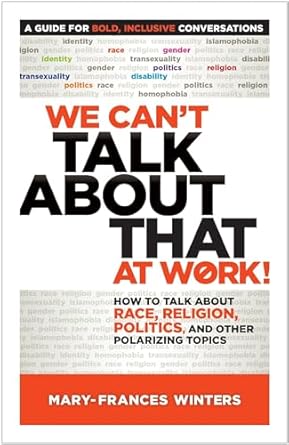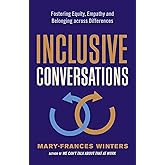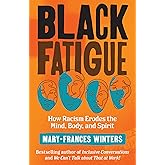Buy new:
-29% $13.50$13.50
Save with Used - Acceptable
$8.06$8.06

Download the free Kindle app and start reading Kindle books instantly on your smartphone, tablet, or computer - no Kindle device required.
Read instantly on your browser with Kindle for Web.
Using your mobile phone camera - scan the code below and download the Kindle app.



 Audible sample
Audible sample Follow the author
OK
We Can't Talk about That at Work!: How to Talk about Race, Religion, Politics, and Other Polarizing Topics Paperback – Illustrated, April 23, 2017
There is a newer edition of this item:
Purchase options and add-ons
Conversations about taboo topics happen at work every day. And if they aren't handled effectively, they can become polarizing and divisive, impacting productivity, engagement, retention, teamwork, and even employees' sense of safety in the workplace.
In this concise and powerful book, Mary-Frances Winters shows how to deal with sensitive subjects in a way that brings people together instead of driving them apart. She helps you become aware of the role culture plays in shaping people's perceptions, habits, and communication styles and gives detailed guidance for structuring conversations about those things we're not supposed to talk about.
Preparation is crucial—but so is intent. Winters advises you to “come from your heart, learn from your mistakes, and continue to contribute to making this a more inclusive world for all.”
- Print length184 pages
- LanguageEnglish
- PublisherBerrett-Koehler Publishers
- Publication dateApril 23, 2017
- Dimensions5.56 x 0.54 x 8.5 inches
- ISBN-101523094265
- ISBN-13978-1523094264
Book recommendations, author interviews, editors' picks, and more. Read it now.
Customers who bought this item also bought
 DEI Deconstructed: Your No-Nonsense Guide to Doing the Work and Doing It RightHardcoverFREE Shipping on orders over $49 shipped by AmazonGet it as soon as Friday, Jan 3
DEI Deconstructed: Your No-Nonsense Guide to Doing the Work and Doing It RightHardcoverFREE Shipping on orders over $49 shipped by AmazonGet it as soon as Friday, Jan 3 Racial Justice at Work: Practical Solutions for Systemic ChangePaperbackFREE Shipping on orders over $49 shipped by AmazonGet it as soon as Friday, Jan 3
Racial Justice at Work: Practical Solutions for Systemic ChangePaperbackFREE Shipping on orders over $49 shipped by AmazonGet it as soon as Friday, Jan 3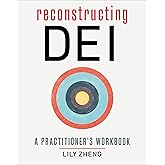 Reconstructing DEI: A Practitioner's WorkbookPaperbackFREE Shipping on orders over $49 shipped by AmazonGet it as soon as Friday, Jan 3
Reconstructing DEI: A Practitioner's WorkbookPaperbackFREE Shipping on orders over $49 shipped by AmazonGet it as soon as Friday, Jan 3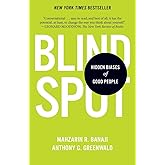
From the Publisher

|
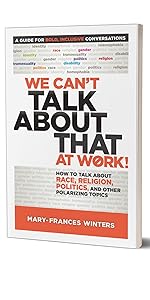
|
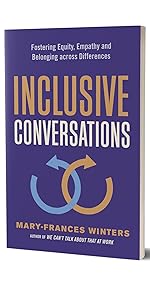
|
|
|---|---|---|---|
| Black Fatigue | We Can’t Talk about That at Work! | Inclusive Conversations | |
| Customer Reviews |
4.8 out of 5 stars
1,183
|
4.6 out of 5 stars
463
|
4.7 out of 5 stars
224
|
| Price | $9.57$9.57 | $13.50$13.50 | $6.71$6.71 |
| Books by Mary-Frances Winters | This is the first book to define and explore Black fatigue, the intergenerational impact of systemic racism on the physical and psychological health of Black people—and explain why and how society needs to do more to combat its pernicious effects. | Instead of shutting down any mention of taboo topics, Mary-Frances Winters shows how to structure intentional conversations about them, so people can safely confront biases and stereotypes and create stronger, more inclusive organizations. | "What is impressive is not only how Winters builds a case for the urgency for inclusive conversations but that she also gives specific strategies and competencies to turn her theory into practice.” —Dr. Sheila Robinson, CEO, Diversity Woman Media |
Editorial Reviews
Review
—Rohini Anand, PhD, Senior Vice President, Corporate Responsibility, and Global Chief Diversity Officer, Sodexo
“This is the book we have been waiting for. Read it, learn from it, acquire the skills described in it. And then with courage, patience, and practice, you will be prepared to have those difficult but necessary conversations in your workplace.”
—Johnnetta Betsch Cole, PhD, President Emerita, Spelman College and Bennett College
“Mary-Frances Winters has done it again! Her real-life examples are compelling, and her ‘best practices' can have an immediate impact on everyone who reads her book.”
—Mitchell R. Hammer, PhD, President, Intercultural Development Inventory, LLC; Intercultural Conflict Style Inventory, LLC; and Safe Dialogue, LLC
“I'm very excited about the release of We Can't Talk about That at Work! The issue of discussing polarizing topics at work is a really tough one. People are not comfortable having uncomfortable conversations. I'm happy that there will finally be a resource to guide us all on how to get comfortable being uncomfortable.”
—Michele C. Meyer-Shipp, Esq., Vice President and Chief Diversity Officer, Prudential Financial, Inc.
“This book is a comprehensive, practical, and highly accessible tool for empowering people to have the brave conversations that are needed in these tumultuous times. Mary-Frances has given readers an invaluable resource for organizations and individuals to navigate the charged times that we live in and make a contribution toward cocreating a more compassionate future.”
—Nene Molefi, diversity and inclusion thought leader and CEO, Mandate Molefi
“Mary-Frances Winters's wisdom shines throughout this book. She helps us understand deeply why we need to talk about polarizing topics—yes, at work—and then proceeds to show us how with care, concern, and compassion for those who may not agree with us. I hope that all leaders and employees read it and implement her wise suggestions and counsel.”
—Julie O'Mara, coauthor of Global Diversity and Inclusion Benchmarks and other inclusion works and Past-President, American Society for Training & Development (now ATD)
“We are living in times of crisis. Day after day, we are confronted with polarization about issues of real import to our society and our world that can seem difficult, if not impossible, to talk about. And yet this is not a time for timidity. We must talk about these issues if we are going to cross the great divides in our ideologies and exist together in civil society. Mary-Frances Winters has created an extremely helpful guide for better understanding and navigating those difficult conversations. Be bold—use this book!”
—Howard Ross, founder and Chief Learning Officer, Cook Ross
“We Can't Talk about That at Work! has hit the mark. This body of work is critically important to advancing inclusion and dialogue in our workplaces. As we work diligently to increase our diversity, we struggle with inclusion and having the difficult conversations about the various aspects of diversity. Now, we have a road map and tools to support diversity professionals, leaders, and employees in any work environment. This will be the book used by all.”
—Darlene Slaughter, Vice President and Chief Diversity Officer, United Way Worldwide
“In the current global political and social climate, characterized by increasingly polarized views, the ability to embrace views different from our own, without judgment or vilification, is more critical than ever. It is also at the heart of all diversity and inclusion work. For with all our ideals, we often overlook the fact that diversity and inclusion can be hard. In We Can't Talk about That at Work!, Mary-Frances addresses this issue head-on, providing practical skills to empower leaders and managers to have effective dialogue across difference.”
—Kate Vernon, Director, Strategic Programmes, Community Business
“The presidential farewell address is a perfect way to set up this powerful and practical guide to effectively engaging in conversations about polarizing issues. I too believe that we need to meet people where they are, and not expect them to necessarily see the world from our view, and that we all have work to do to close the cultural divide and change hearts. What makes this book different is its soft approach to bold conversations, using talking tips, templates, and reflection questions.”
—Tyronne Stoudemire, Vice President of Global Diversity and Inclusion, Hyatt Hotels Corporation, and Adjunct Lecturer of Management and Organization, Kellogg School of Management, Northwestern University
“Whether in her writing, public speaking, or consulting, Mary-Frances Winters always delivers. Deep subject matter expertise, strategic thinking, sociocultural insights, contemporary application, and wisdom will spill out of these pages as you engage with it.”
—Andrés Tapia, Senior Client Partner and Global Practice Leader, Workforce Performance, Inclusion and Diversity, Korn Ferry Hay Group, and author of The Inclusion Paradox
About the Author
Excerpt. © Reprinted by permission. All rights reserved.
We Can't Talk About That At Work!
How To Talk About Race, Religion, Politics, and Other Polarizing Topics
By Mary-Frances WintersBerrett-Koehler Publishers, Inc.
Copyright © 2017 Mary-Frances WintersAll rights reserved.
ISBN: 978-1-5230-9426-4
Contents
Preface, xi,1 Why Do We Have to Talk about THAT at Work?, 1,
2 Get Yourself Ready for Bold, Inclusive Conversations, 19,
3 Expand Your Understanding of Others and Assess Organizational Readiness, 41,
4 Prepare: Why, Who, What, How, Where, and When?, 67,
5 Let the Conversations Begin: Search for Shared Meaning, 87,
6 Let the Conversations Continue: Interpret and Bridge Differences, 107,
7 Sharpen Inclusive Habits, 119,
Glossary, 139,
Notes, 145,
Acknowledgments, 153,
Index, 155,
About the Author, 161,
CHAPTER 1
Why Do We Have to Talk about THAT at Work?
High performing leaders are able to unite diverse team members by building common goals and even shared emotions by engaging in powerful and effective dialogue.
GEORGE KOHLRIESER, Clinical and Organizational Psychologist1
Why in the world would we want to encourage employees to talk about polarizing topics in the workplace? We come to work in order to make products and provide services for our customers, members, and/or clients — not to talk about social issues. Topics such as race, politics, and religion are inappropriate and should be discouraged.
Perhaps this is how you feel. For as long as I can remember, this has been the prevailing sentiment for many organizations and corporate environments. However, there are compelling reasons why a position of avoidance is no longer the best policy.
The most persuasive reason for building the skills necessary to talk about polarizing topics at work is that they are already being talked about or thought about, more than you may think. Social media is a huge factor in the increased visibility of and exposure to these issues. And even as these topics remain top of mind for most of us, in general, we lack the skills to have effective dialogue.
The goal of this book is to help you make the conversations that are already happening more productive, supportive, and inclusive, leaving people feeling whole and ultimately resulting in better teamwork, productivity, and engagement.
A POLARIZED SOCIETY LEADS TO A POLARIZED WORKPLACE
When race enters our public conversations about these important national issues, the dialogue is too often dehumanizing and racially charged. Language matters, and we need more tools to move our race conversations forward in more accurate, fair, and productive ways.
President Barack Obama
As the workforce becomes more diverse, there are more people from different racial/ethnic groups, religious affiliations, political affiliations, sexual orientations, and disability statuses who may be facing very different realities than ever before. We are living in times of heightened social conflict around race, religion, and politics. The last few years have been filled with instances of police brutality, the shooting and killing of police officers, immigration debates, religious intolerance against Muslims and Jews, heightened awareness of transgender rights and its backlash, terrorism, and extreme political divisions, making it impossible for many not to bring strong emotions about these issues into the workplace.
Social scientists contend that the more we feel threatened, the greater our tendency to be "tribal" and polarized. Tribalism is part of human nature. We've found that many people feel that their way of life is being threatened by terrorism, demographic changes, and new technology. When people are fearful, the gut level response is to blame "the other tribe(s)" for their plight. With so many complex issues facing society today, there is more polarization than ever before. Consider these realities:
* In a 2016 survey that explored the state of race relations in the United States, only 44 percent of white people were very concerned about the killings of black people at the hands of police, compared to 77 percent of black responders. However, when asked about the killings of police officers in Dallas, over 75 percent of both black and white people were very concerned.
* In a survey on race and workplace trauma conducted by The Winters Group, six in ten whites answered that they think their organization understands the unique experiences of blacks in the workplace. In direct contrast six in ten blacks answered that they did not think their organization understands their unique experiences.
* The vote for Britain to exit the European Union has largely been attributed to class issues and xenophobia. A headline in the Guardian in June 2016 read, "BREXIT is the only way the working class can change anything." The results of the election showed deep class divides. Many working-class Brits blame immigration for the loss in jobs. Between 1993 and 2014, the number of immigrants into the UK surged from 3.8 million to 8.3 million.
* A recent poll showed that 56 percent of Americans feel that Muslim values are at odds with US values. However, 68 percent said that they had never or seldom talked to a Muslim.
* In a Pew survey on gender equality, 56 percent of men said that obstacles inhibiting women's progress are largely gone. Only 34 percent of women shared that view.
* According to a global study conducted by Unilever based on interviews with 9,000 men and women across eight global markets, stereotypes and inappropriate behavior targeting women in the workplace still prevail. Sixty-seven percent of women in the study reported that they feel pressured to "get over" inappropriate behavior, and 55 percent of men and 64 percent of women believe that men do not challenge each other when they witness such behavior.
* Relative to political polarization in the United States, a Pew study showed that 93 percent of Republicans are more conservative than the median Democrat, while a nearly identical share of Democrats (94 percent) is more liberal than the median Republican. Twenty years ago, there was a much smaller divide, with 64 percent of Republicans to the right of the median Democrat, and 70 percent of Democrats to the left of the median Republican.
* The inauguration of Donald Trump as the 45th president of the United States drew strong protests around the world. Globally, over three million people participated in the Women's March to protest the election of President Trump, who they feel does not represent the values espoused by the United States, especially those policies geared toward gender equality, health care for women, religious freedom, and LGBTQ rights. Protesters said that they joined the marches because of Trump's divisive campaign and his disparagement of women, minorities, and immigrants.
* The North Carolina HB2 bill, known as the "bathroom bill," requires transgender people to use public bathrooms associated with their birth sex. As a result, a number of organizations cancelled high-profile events in the state, resulting in millions of dollars of lost revenue.
* Environmental justice and racism, both highly political subjects, intersected in mid-2016 when the US Army Corps of Engineers authorized the Dakota Access Pipeline project (DAPL), which threatened the safety and sanctity of the Standing Rock Sioux tribe's water and sacred cultural sites. The project sparked national protests and a grassroots movement that sought to reaffirm the humanity of indigenous people and their land. The DAPL has sparked polarization among business, political, and Native American communities.
* There has been ongoing dissention around the term "Redskin" and other mascots that denigrate Native American communities. As of 2010, over 115 professional organizations — representing civil rights advocates, educational institutions, athletes, and scientific experts — have published resolutions or policies that state that the use of Native American names and/or symbols by non-native sports teams is a harmful form of ethnic stereotyping that promotes misunderstanding and prejudice, which contributes to other problems faced by Native Americans. 14 However, as of the publication date of this book, the Washington, DC, football team has not changed its name.
* We see a great deal of polarization and discourse around immigration. A range of countermeasures have been put forth — from building a wall to the more liberal proposal of the Dream Act, a multi-phased process for undocumented residents to provide conditional residency leading to permanent status. Due in part to political dissention, the bill never passed.
* While conversations about disability and people with disabilities may not be deemed as polarizing, I have found that we shy away from the subject matter, even in discussions around diversity. Perhaps this is because we do not know how to effectively have these bold conversations. In 2014, the British charity Scope conducted a survey that found two-thirds of British people feel uncomfortable or awkward talking to somebody who is disabled.
Kate Vernon, director of strategy programs at Community Business and author of extensive research on diversity and inclusion in Asia, makes this observation:
It can be difficult to have open and honest conversations about race in Asia. We often talk about culture and the impact of different cultural profiles on communication and working styles — but we rarely address the biases and prejudices that exist about or between different ethnic groups, or openly acknowledge the power and privilege that certain groups enjoy. But there is no doubt that racism does exist in Asia. Whether it be India or Hong Kong, Japan or Singapore, there is an unspoken, often complex racial hierarchy that many will recognize but be wary to articulate. If we are to promote a culture of true inclusion, we need to find a way to broach this sensitive topic. Yet the Asian preference for promoting harmony, saving face, and showing respect can make having such bold conversations doubly hard.
These polarized views and often-avoided topics drive attitudes, perceptions, and behaviors. If I no longer believe there are barriers for women in the workplace, I would see no need for special programs designed to bolster women's chances for advancement. If I am not concerned about the shootings of unarmed black men, then I may not be empathetic to workers who are fearful and traumatized by such events.
POLARIZATION THWARTS INCLUSION; INCLUSION DRIVES ENGAGEMENT
Polarization thwarts attempts for inclusion. Polarization is the opposite of inclusion. Polarization fosters an "us-and-them" environment, whereas inclusion attempts to create a sense of belonging and unity. Most major organizations today have a goal to create an inclusive culture because they realize that inclusion drives engagement. As reported in a 2013 Gallup study, inclusion and engagement are highly correlated. The results showed that the most engaged employees rated the company high on diversity and inclusion. The least engaged employees rated the company very low on the questions related to diversity and inclusion. The Winters Group conducted a survey with a large financial institution that showed similar results. Inclusion was the highest correlated factor to engagement.
When employees feel that they are psychologically safe, they are also more engaged and innovative. According to a study by Catalyst that surveyed Australian workers, employees who experience psychological safety feel that they can freely speak up about problems and tough issues. One's perception of psychological safety is based on a belief about the organization's norms or culture, which I cover in Chapter 3. The same study identified four leadership characteristics that enable psychological safety across race, gender, and other demographic variables. They are accountability, courage, humility, and empowerment. I speak to courage and cultural humility in Chapter 2.
THE IMPACT OF SOCIAL MEDIA ON POLARIZATION
Social media outlets are exacerbating the increase in polarization. Instantaneous access to breaking news and opinions via tools such as Twitter, Facebook, Snapchat, and others has magnified opportunities to engage in contentious conversation and debate. People routinely use their smart phones to record all sorts of events that go viral for the whole world to see and comment on.
Before social media, we weren't as likely to be constantly confronted with polarizing topics such as race, religion, and politics unless we were news junkies. In the workplace, it is easy, even if against company policy, to have ongoing access to social media on our smart devices. Therefore, many people are constantly debating and sharing their opinions and beliefs on social media; and to the extent that they are virtually connected to coworkers, they are having these conversations at work, or in a workplace context. Social media makes it very easy to know the beliefs and opinions of coworkers.
The more that an individual's personal beliefs are repeated (i.e., go viral), the more they become accepted as fact. By the same token, the more an individual's or a group's beliefs are challenged, the more they are believed by that group. When beliefs are challenged, the human tendency is to become more obstinate and determined to defend the opinion. In other words, we dig our heels in deeper, as the saying goes. Any attention to the belief or opinion, positive or negative, acts as fuel for the fire.
Let's take Facebook, for example. The personal nature of this form of electronic communication can keep our emotions in high gear. We tell our Facebook friends what we like and what we don't like. When we disagree with a friend on Facebook we continue to post more rationale for our own position, and they, in turn, post more for their position, increasing the polarization. In the extreme, when a friend posts something we don't like, we can "un-friend" them. In other words, we can stay firmly rooted in our own beliefs, totally rejecting another's viewpoint. We take an "I don't want to hear it" attitude and in some cases, an "I don't like you anymore." We are often unable to separate the person from their position. I discuss the need to separate the person from the position in Chapter 3.
Many people today are addicted to social media. Social and behavioral scientists are busy studying the psychological ramifications of this fairly new phenomenon. I have talked with many people who say they have disconnected from social media and now feel less stressed. Some, who have not done so, bring these intense emotions and associated anxiety with them to work. And they do not stop communicating on polarizing issues just because they are at work.
THE IMPACT ON EMPLOYEES, IN THEIR OWN WORDS
The Winters Group has conducted a number of dialogue sessions for a variety of different clients over the past year, supporting them in effectively addressing the aftermath of recent traumatic events and the polarized views that seem to always be associated with them. My first request is "Describe how you are feeling in one word." The responses range from depressed, despondent, frustrated, angry, helpless, and hopeless to encouraged, energized, hopeful, and optimistic. However, a majority of the emotions are negative.
Psychologists believe that the recurrence of unfortunate events intensifies feelings of stress and trauma. The more we see images of police shootings, terrorist attacks, and other acts of violence, the more we are likely to experience effects likened to post traumatic stress syndrome. Individuals who are most impacted by these events — for instance, black men fearful that they will be wrongly targeted by police, Muslim women in hijabs afraid they will be subject to bullying or worse, transgendered employees afraid to use the bathroom that corresponds to their gender identities — are likely distracted at work. This impacts engagement and productivity.
The Winters Group has conducted several public, free virtual learning webinars to address some of these issues. One was called Race & Workplace Trauma during the Age of #BlackLivesMatter. More than 250 people were in attendance. Another, called Let the Healing Begin: Restoring Our Quest for Inclusion, was conducted immediately following the 2016 presidential election. Over 600 registered for this 90-minute session. We polled participants during both sessions to explore the extent to which these events impacted their productivity at work. More than 60 percent admitted that there was either a "great deal" or "somewhat" of an impact.
Here are some perspectives shared during these sessions:
"I came to work the day after the Philando Castile killing and I said to my boss that I was pretty upset, and I got nothing, not even an acknowledgment. This really shook me up and now I don't know if I can really trust her."
— African American male at large consulting company (I heard similar sentiments from several others from different companies.)
"I am Muslim, gay, and from the Middle East. That is three strikes against me. When I am waiting for the train at the metro station I don't stand near the edge because I am afraid someone might push me in. I bring that fear to work with me every day. It does impact my ability to concentrate and do my best work."
— male employee at a not-for-profit research organization
"I was at work and got a call from my child at school. He was terrified because the kids were telling him that he was going to be deported. I felt a need to leave and go and get him. My boss understood."
— Latina employee at a large service organization
"Our company sent out a statement after the Pulse Night Club shooting but said nothing about the killings of unarmed black men. Why does one group deserve acknowledgment and sympathy and our group [African Americans] does not?"
— African American employee at a large consulting firm (I heard similar statements from African Americans at several different companies.)
(Continues...)Excerpted from We Can't Talk About That At Work! by Mary-Frances Winters. Copyright © 2017 Mary-Frances Winters. Excerpted by permission of Berrett-Koehler Publishers, Inc..
All rights reserved. No part of this excerpt may be reproduced or reprinted without permission in writing from the publisher.
Excerpts are provided by Dial-A-Book Inc. solely for the personal use of visitors to this web site.
Product details
- Publisher : Berrett-Koehler Publishers; 1st edition (April 23, 2017)
- Language : English
- Paperback : 184 pages
- ISBN-10 : 1523094265
- ISBN-13 : 978-1523094264
- Item Weight : 7.8 ounces
- Dimensions : 5.56 x 0.54 x 8.5 inches
- Best Sellers Rank: #266,526 in Books (See Top 100 in Books)
- #333 in Human Resources & Personnel Management (Books)
- #402 in Workplace Culture (Books)
- #816 in Communication Skills
- Customer Reviews:
About the author
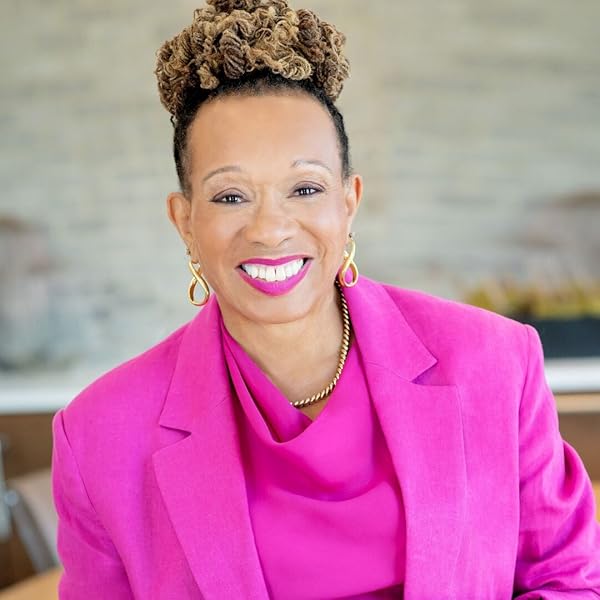
Mary-Frances Winters, founder and CEO of The Winters Group, Inc., a 39-year-old global diversity, equity, inclusion and justice consulting firm, truly believes that diversity and inclusion work is her "passion and calling." Dubbed a thought leader in the field, for the past three decades she has impacted over hundreds of organizations and thousands of individuals with her thought-provoking message, and her approach to diversity and inclusion. Ms. Winters is a master strategist with experience in strategic planning, change management, diversity, organization development, training and facilitation, systems thinking and qualitative and quantitative research methods. She has extensive experience in working with senior leadership teams to drive organizational change.
Among her many awards and distinctions, she was named a diversity pioneer by Profiles in Diversity Journal in August 2007 and most recently received the Winds of Change award from the Forum on Workplace Inclusion in 2016. Ms. Winters was also featured in Forbes’ June 2016 publication, which honored some of the DC Metro area’s most powerful women. In November 2019, she was named by Forbes as one of 10 trailblazers in diversity and inclusion.
She has served as a torch bearer for the Olympics and has previously been recognized as an Athena Award winner from the Chamber of Commerce for her contributions to women and the community.
Ms. Winters is the author of seven books: Racial Justice at Work: Practical Solutions for Systemic Change (February 2023), Black Fatigue: How Racism Erodes the Mind, Body, and Spirit (September 2020), Inclusive Conversations: Fostering Equity, Empathy, and Belonging Across Differences (August 2020), We Can’t Talk about That at Work!: How to Talk about Race, Religion, Politics, and Other Polarizing Topics (2017), Only Wet Babies Like Change: Workplace Wisdom for Baby Boomers, Inclusion Starts With “I” and CEO’s Who Get It: Diversity Leadership from the Heart and Soul. Ms. Winters also authored a chapter in the book Diversity at Work: The Practice of Inclusion (2013) and numerous articles.
She is a graduate of the University of Rochester with undergraduate degrees in English and Psychology, and a master’s degree in business administration from the William E. Simon Executive Development Program. She received an honorary doctorate from Roberts Wesleyan College.
She serves on the board of Trustees of The University of Rochester, The board of Visitors for Johnson C. Smith University and The Council on Black Health.
Customer reviews
Customer Reviews, including Product Star Ratings help customers to learn more about the product and decide whether it is the right product for them.
To calculate the overall star rating and percentage breakdown by star, we don’t use a simple average. Instead, our system considers things like how recent a review is and if the reviewer bought the item on Amazon. It also analyzed reviews to verify trustworthiness.
Learn more how customers reviews work on AmazonCustomers say
Customers find the book insightful and practical for guiding inclusive conversations. They appreciate its clear explanations and helpful exercises that guide them through sensitive topics. The book is concise and easy to understand, providing useful suggestions and outlines for teaching without being preachy.
AI-generated from the text of customer reviews
Customers find the book easy to read and useful for guiding inclusive conversations. They appreciate the practical guidance and wisdom on sensitive topics. The self-understanding items are particularly helpful. Readers find it a great resource beyond textbooks, with suggestions and outlines for teaching.
"...Not only is it well written and easy to read but the content is incredibly relevant to today’s work environment and with everything that’s going on..." Read more
"...It offers many tools to leverage and equip people to have necessary yet difficult conversations while bridging differences...." Read more
"...Winters’ book about how to have successful, productive conversations about polarizing topics...." Read more
"An important read. Smart, insightful and practical, Winters provides a well-articulated case for having bold, inclusive conversations at work as..." Read more
Customers find the book concise and easy to understand. They say it provides practical guidance and step-by-step instructions without being preachy. The content is well-written and relevant.
"...Not only is it well written and easy to read but the content is incredibly relevant to today’s work environment and with everything that’s going on..." Read more
"...I’m glad I read “WCTATAW.” It was easy to read and it flowed...." Read more
"...case for having bold, inclusive conversations at work as well as clear, step-by-step guidance on how complex dialogue can happen in a positive way..." Read more
"...It is easy to read and also inspirational. I thought I knew how to have these tough conversations.. but I learned a lot from this book...." Read more
Top reviews from the United States
There was a problem filtering reviews right now. Please try again later.
- Reviewed in the United States on January 3, 2024Someone recommended this book to me and I am so glad they did. Not only is it well written and easy to read but the content is incredibly relevant to today’s work environment and with everything that’s going on in our country and in the world. Great for managers and non managers alike.
- Reviewed in the United States on July 25, 2024This book provides so much depth and insight that's constructive and balanced. It offers many tools to leverage and equip people to have necessary yet difficult conversations while bridging differences. I highly recommend it for anyone committed to a journey of allyship and inclusivity.
- Reviewed in the United States on December 11, 2022I appreciate Mary-Francis Winters’ book about how to have successful, productive conversations about polarizing topics. I think the work of The Winters Group is important and should continue in helping to establish cultures of diversity and inclusion in organizations.
I just don’t think the process described in this book is practical for most organizations. The author suggests that these conversations not be spontaneous, but I think in reality this is how these conversations are happening and most often that’s how they will continue to happen. Understanding the principles from this book can help make these conversations more peaceful and productive.
Perhaps the process described in this book might be more practical for organizations that have had incidents and major tension around a polarizing topic. Company required diversity education, protective policies, corporate diversity goals and events that celebrate diversity are real ways that can help diverse people feel valued and create a culture of diversity and inclusion in the workplace. Workplace book club discussions and recommended reading of these kinds of books can also help.
I thought the examples focused too much on conversations about race, specifically, black and white. Of course this is a major and valid polarizing issue. But not the only issue that needs addressing.
On a side note, this book caused me to deal with some of my own bias. It caused me to bring it to the surface and decide to think about why I felt the way I felt and admit to myself that this thinking is wrong. And that my supporting reasons for thinking that way are also invalid. I prayed about it and decided to actively change the way I think going forward.
There is some really good wisdom about how to address sensitive topics. I will definitely go back through and highlight strategies that’s spoke to me and try to absorb them and carry them with me as I communicate with others (especially the list of inclusive habits to live by on page 119).
I’m glad I read “WCTATAW.” It was easy to read and it flowed. I think it can make a difference in the way professionals and others communicate about polarizing topics.
- Reviewed in the United States on January 19, 2022An important read. Smart, insightful and practical, Winters provides a well-articulated case for having bold, inclusive conversations at work as well as clear, step-by-step guidance on how complex dialogue can happen in a positive way for beneficial outcomes. This is BIG work. One of things I admired about Winters writing was her description of what could be perceived as impossible work, my “talking to her on the page” as I read, saying something like “…this is not realistic… how could I possible do this and produce my event and do my grant proposals, and…” and I’d turn the page and Winters intuitively responds, writing (I’m paraphrasing): “I know what you’re thinking. Your time and workload don’t afford time to commit to this work…” Although I’m not sure how this guide fits into my personal journey or my organization’s, it is definitely a must read for its thoughtful, the 360-degree view.
- Reviewed in the United States on May 28, 2017I've known Mary-Frances and admired her work for a long time. AND I think this most recent contribution to her many gifts to others is one of her most helpful. It is easy to read and also inspirational. I thought I knew how to have these tough conversations.. but I learned a lot from this book. It is one that I will readily give to others and include in my work. It is timely, too. We all need to step up and -- yes -- talk about this. I've always been told to steer clear of politics at work.. but I see that I need to stand up for my beliefs -- and more importantly be a better listener.
- Reviewed in the United States on August 22, 2020The content wasn’t very helpful or useful. My employer recommended reading it before office racism discussions started. For the life of me I don’t know why this book was chosen as a facilitating resource.
- Reviewed in the United States on May 10, 2017We Can't Talk about That at Work!: How to Talk about Race, Religion, Politics, and Other Polarizing Topics
We are in the mist of one of the polarizing times in the World's history. People are angry, divided and afraid because of Global and local events of police brutality, terrorism, sexism and racism. Typically, people impacted directly or indirectly by these events hold their emotions and concerns inside and become stressed and less effective, or seek the anonymity of the internet to console themselves or lash out at others.
We can't talk about that at work contains compassionate, pragmatic and sage advice about how to talk about these realities at work in manner that leads to personal growth, effective relationships and organizational benefit. Through research, case studies, role-playing, exercises and self-assessments, Mary-Frances Winters has provided an engaging guide for people to talk about issues of race, religion and politics at work that will benefit employees and organizations.
- Reviewed in the United States on May 23, 2017In today's environment our ability to have difficult and uncomfortable conversations is more important than ever. Mary-Frances Winters has just made it easier. Her new book "We Can't Talk About That at Work" breaks it down into an easy to understand process. She provides "Real" world examples that gave me the opportunity to reflect on some of my own situations. The tips at the end of each chapter really give you some "go do" actions to get you started. This is truly an empowering book that is a must read for everyone!

